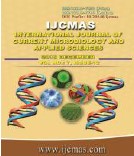


 National Academy of Agricultural Sciences (NAAS)
National Academy of Agricultural Sciences (NAAS)

|
PRINT ISSN : 2319-7692
Online ISSN : 2319-7706 Issues : 12 per year Publisher : Excellent Publishers Email : editorijcmas@gmail.com / submit@ijcmas.com Editor-in-chief: Dr.M.Prakash Index Copernicus ICV 2018: 95.39 NAAS RATING 2020: 5.38 |
Khasi mandarin orange is an important horticulture crop in Meghalaya but several losses have been reported due to the post-harvest disease Penicillium rot caused by Penicillium sp. B. subtilis was evaluated for its efficacy against Penicillium sp. under in-vitro. A total of 260 isolates were isolated from samples collected from different habitats of Meghalaya. Twelve B. subtilis isolates were identified by morphological, biochemical and molecular identification and studied for their antagonistic properties against Penicillium sp. The habitats of these 12 B. subtilis isolates were recorded to befrom crop rhizosphere, mixed manure, fishery pond, mushroom compost and jhum area. Based on the antimicrobial traits, 6 B. subtilis isolates (Bs 167, Bs 197, Bs 217, Bs 219, Bs 256 and COB5Y1) were found with potential antagonistic properties as they were tested positive to chitinase and protease production. Bioassay showed that B. subtilis isolate COB5Y1 was recorded with the highest disease inhibition per cent against Penicillium sp. with 88.11% followed by Bs 167 (80.82%) and Bs 197 (54.82%). Four isolates COB5Y1, Bs 167, Bs 197 and Bs 217 were found with potential antagonistic properties as they could produce chitinase and protease and also were recorded with the maximum percentage of inhibition in dual test.
 |
 |
 |
 |
 |